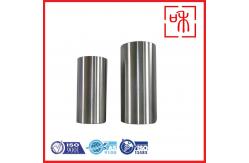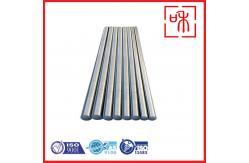Fair Machinability Grade 3 Titanium Bars The Perfect Solution for Medical Applications
|
|
Introduction of Titanium Bar: Titanium alloys are essential in the medical field due to their unique properties tailored to meet the rigorous demands of medical applications. Among these, Grade 3 titanium is particularly favored, especially in bar form for various medical devices and implants. This article explores the characteristics, benefits, and uses of Grade 3 titanium bars, highlighting their vital contribution to patient care and advancements in healthcare technology.
Medical Titanium Bars: Key Features and Specifications
Materials: Gr1,Gr2, Gr3, Gr4, Gr5, Gr5 ELI, Ti-6Al-7Nb,Gr23 Standard: ASTM F67, ASTM F136, ISO 5832-2, ISO 5832-3, ISO 5832-11 Surface: Polished Diameter:4-96mm Length:1000mm, 2000mm,3000mm , or customized by customers Shape: round, flat State: annealing (M) Torlerance: h6, h7, h8, h9 Medical titanium bars play a vital role in various applications, especially for surgical implants like bone nails and dental components. These bars adhere to industry standards such as ASTM F67, ASTM F136, and ISO 5832-3, ensuring quality and reliability. Available in material grades including Grade 2, Grade 5, and Grade 23 (Ti6Al4V ELI), they typically range in diameter from 5mm to 20mm, with a standard length of 3000mm or customizable options. The bars feature a round shape and a bright surface finish, meeting tolerance grades of h7, h8, h9, and h10. Supplied in an annealed state, they are certified under ISO 9001, with optional third-party inspections (e.g., SGS, TUV). Packaging is offered in export cartons or plywood cases, and quality assurance includes an EN10204.3.1 certificate, ensuring compliance with rigorous quality standards.
Chemical composition of medical tianium bar:
Equivalent Grades for Gr 5
The Advantages of Titanium RodsTitanium rods are gaining popularity across various industries due to their exceptional properties that set them apart from traditional materials like steel and aluminum. Here, we explore the key benefits of using titanium rods. BiocompatibilityOne of the most notable features of titanium is its biocompatibility. This means it is non-toxic and does not provoke adverse reactions in the human body, making it the material of choice for medical applications such as implants, dental devices, and prosthetics. As the healthcare sector continues to evolve, the demand for titanium is on the rise, driven by its safety and effectiveness in medical environments. Non-Magnetic PropertiesAnother significant advantage of titanium is its non-magnetic nature. This characteristic makes it ideal for use in medical equipment, particularly in MRI machines, where magnetic interference could compromise functionality. Ensuring safety and accuracy in medical imaging is critical, and titanium’s non-magnetic properties contribute greatly to this goal. High Strength-to-Weight RatioTitanium boasts an impressive strength-to-weight ratio, surpassing that of steel while remaining significantly lighter. This feature is particularly valuable in industries where weight reduction is essential, such as aerospace and automotive. By incorporating titanium rods, manufacturers can achieve stronger components without adding excessive weight, which is crucial for enhancing performance and fuel efficiency. Exceptional Corrosion ResistanceThe natural oxide layer that forms on titanium provides outstanding resistance to corrosion. This property enables titanium to perform reliably in harsh environments, including marine and chemical settings, where other materials may degrade rapidly. Whether used in underwater applications or chemical processing, titanium’s resilience against corrosion ensures long-lasting performance. DurabilityTitanium's durability is another compelling reason to choose it over other materials. It exhibits a high resistance to wear and tear, significantly outlasting many alternatives. This longevity translates into lower maintenance costs and extended service life, making titanium rods an economical choice for various applications, from industrial machinery to consumer goods. AestheticsBeyond its functional advantages, titanium also offers aesthetic appeal. With a unique and attractive appearance, it has become a favored material for jewelry and decorative applications. Its lustrous finish, combined with the ability to achieve vibrant colors through anodization, has made titanium a fashionable choice for high-end accessories. In summary, the diverse benefits of titanium rods—biocompatibility, non-magnetic properties, strength, corrosion resistance, durability, and aesthetic appeal—make them an excellent option for a wide range of applications. As industries continue to seek innovative solutions, titanium rods will undoubtedly play a pivotal role in shaping the future of materials. Technical Parameters:
Applications:Orthopedic implants include artificial joints, metal plates,
orthopedic nails, metal orthopedic use rods, intramedullary nails,
bone needles, and spinal fixation devices. |
||||||||||||||||||||||||||||||||||||||||||||||||||||||||||||||||||||||||||||||||||||||||
| Product Tags: Medical Applications Titanium Bars Fair Machinability Grade 3 Titanium Bars Medical Titanium Bars |
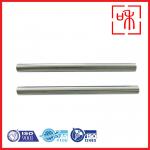
|
Grade 9 Gr9 Titanium Products Titanium Bars Alloy Round Bar For Industrial Applications |
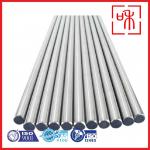
|
ASTM B348 Gr9 Titanium Bars Alloy Round Bar For Demanding Environments Purposes |
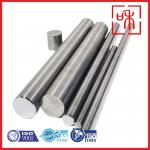
|
ASTM B348 Grade 5 Titanium Alloy Bar Titanium Bars Titanium Round Rod For Medical Purposes |
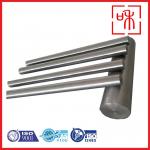
|
Grade 2 Grade 5 Titanium Alloy Bar Titanium Bars ASTM B348 Titanium Round Rod For Industrial Applications |
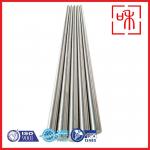
|
Titanium Alloy Bar Titanium Bars Sandblasted Titanium Bars Grade 7 ASTM B348 Titanium Round Rod |
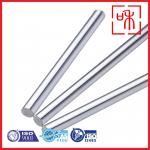
|
Metal Grade 12 Titanium Round Rod For Industrial And Medical Applications ASTM B265 |

